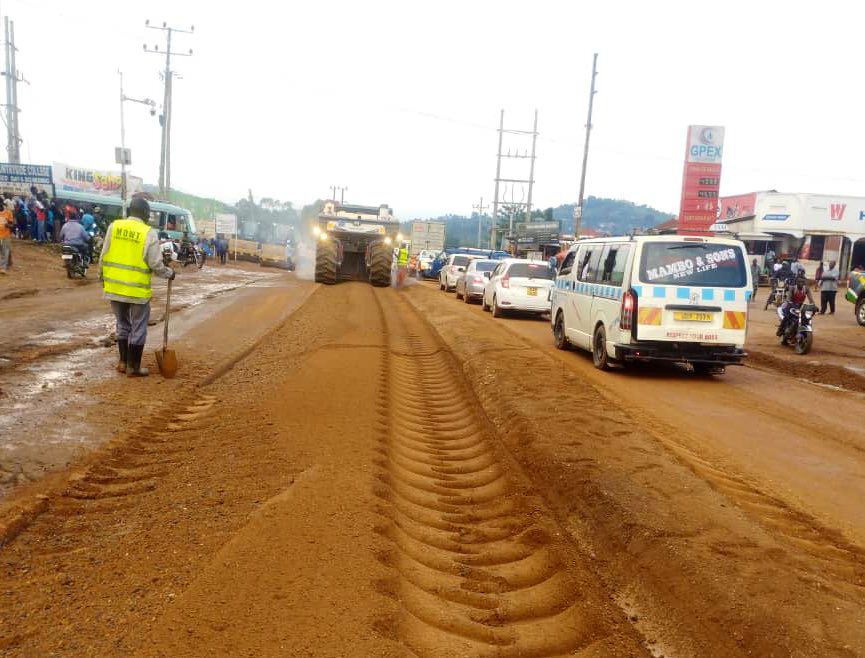No Highway Should Be Allowed to Deteriorate, Says Katumba

Works and Transport Minister Gen Edward Katumba Wamala has pledged urgent government action to restore Uganda’s collapsing highways, beginning with the Kampala–Jinja route, a key regional trade corridor now in a state of disrepair.
“No highway should be allowed to deteriorate,” the minister said on Saturday, adding that the In-House Construction Unit under the Ministry of Works and Transport is being “empowered to respond swiftly and effectively to the emerging needs of the road network.”
The Kampala–Jinja highway, which links Uganda to Kenya and the vital ports of Mombasa and Kisumu, has become a source of growing public frustration.
Once a symbol of Uganda’s economic lifeline, the road is now plagued with gaping potholes, poor drainage, and eroded shoulders that have turned it into a daily hazard for drivers and traders.
A particularly dangerous section between Lugazi and Kitigumba has developed a massive pothole right in the valley, causing daily accidents as trucks hit the depression, lose control, and veer into the ditch.
Although the notorious stretch near the police station in Mabira was repaired recently, residents say several other sections of the blackspot-littered highway have since worsened.
Minister Katumba said the In-House Construction Unit is currently deployed at Namawojjolo and Namataba, addressing “critical bottlenecks in preparation for sealing the section with asphalt.”
He listed Lugazi, Kawolo, Najjembe, Mabira, and Mbikko among other areas slated for urgent intervention.
“We urge road users to exercise caution along these work sections,” he added.
Despite the pledges, the government has been criticised for neglecting the Kampala–Jinja corridor in favour of other infrastructure projects.
More than a decade since the Kampala–Jinja expressway was first proposed, it remains a pipe dream.
Meanwhile, funds were committed to the Kampala–Mpigi expressway, which has stalled, and to the Lwera section of the highway, which is now nearing completion.
Transporters say the delay in upgrading the Kampala–Jinja road is economically reckless.
“This is the most strategic road in the country—it’s the gateway to the sea. But every year we see budgets go to places with less traffic and less trade,” said Edward Kafeero, a fuel transporter who moves goods between Kampala and Nairobi.
The minister’s announcement, while welcome, has been met with scepticism from some road users.
“We’ve heard these promises before,” said Sarah Nakabugo, a produce trader who travels between Mbale and Kampala.
“Last year, they said repairs were coming. Today, the potholes are worse.”
The Kampala–Jinja highway carries thousands of tonnes of cargo daily, including petroleum products, cement, agricultural produce, and industrial goods. However, transporters now face regular breakdowns, increased travel time, and rising accident rates.
Traffic police and local leaders confirm a spike in crashes, especially during rainy weather. “Drivers hit potholes filled with water, swerve suddenly, or burst tyres. That section near Lugazi has become a killer,” said a police officer posted near Najjembe.
The government’s turn to the In-House Construction Unit suggests a shift from its traditional reliance on private contractors. The unit is made up of state engineers and technicians expected to deliver faster, more affordable, and more consistent responses to road damage.
But critics argue that even this approach is not a long-term solution. “We don’t just need spot repairs. We need full-scale reconstruction, including widening, proper drainage, and axle load control,” said Moses Ategeka of the Uganda Road Users Association. “This is not a rural access road—it is the East African artery.”
As Uganda prepares to mark World Environment Day and Parliament debates infrastructure funding in the 2025/26 national budget, the government is under pressure to prove that it can protect key transport corridors from collapse.
For now, many road users remain unconvinced.
“Unless we see graders, engineers, and actual tarmac—not just talk—we’ll continue to suffer,” said Charles Ssegujja, a long-distance driver.
“They promised us the Kampala–Jinja expressway. What we got instead is the expressway to misery.”



0 Comments